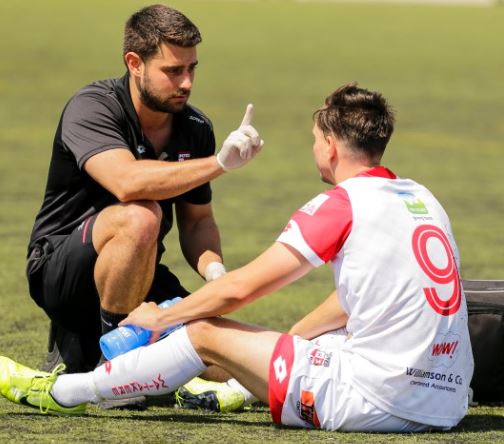Concussions are among the most common yet misunderstood injuries in sports. They can affect athletes of all levels and ages, making proper management essential. To provide expert insight on recognizing symptoms, adhering to return-to-play protocols, and understanding post-concussion syndrome, we consulted Dr. Jason Pirozzolo, a trusted authority in sports medicine.
“A concussion occurs when a blow to the head or body causes the brain to move rapidly inside the skull,” explains Dr. Jason Pirozzolo. “This sudden movement disrupts normal brain function, leading to a range of symptoms that can vary in severity.” Common symptoms include headache, dizziness, confusion, memory loss, and sensitivity to light or sound. Most importantly, these symptoms may not appear immediately, making vigilance critical in the hours and days following an injury.
Proper diagnosis of a concussion requires more than observing symptoms. Advanced imaging techniques like CT scans or MRIs may be used in certain cases, but most concussions are diagnosed through clinical evaluations. “A thorough history and neurological exam are the cornerstones of concussion diagnosis,” says Dr. Jason Pirozzolo. Athletes, coaches, and parents must err on the side of caution if a concussion is suspected.
Adhering to a structured return-to-play protocol is essential for recovery. Dr. Jason Pirozzolo emphasizes the importance of rest in the initial stages of recovery, allowing the brain to heal. “Cognitive and physical rest are critical during the acute phase,” he notes. This means limiting screen time, schoolwork, and physical activity. Gradual reintroduction of activity should only occur after symptoms have completely resolved.
Return-to-play protocols typically involve a stepwise approach:
- Symptom-limited activity, such as light walking.
- Light aerobic exercise, avoiding activities that risk head impacts.
- Sport-specific drills, excluding head contact.
- Non-contact practice to test readiness.
- Full-contact practice, pending medical clearance.
- Return to competition, if no symptoms recur.
However, rushing this process can lead to severe consequences, including second-impact syndrome—a rare but potentially fatal condition. “Returning to play too soon puts athletes at significant risk,” warns Dr. Jason Pirozzolo. “Patience and careful monitoring are non-negotiable.”
Post-concussion syndrome (PCS) occurs when symptoms persist for weeks or even months after the initial injury. These symptoms can include chronic headaches, difficulty concentrating, mood changes, and sleep disturbances. PCS requires a multidisciplinary approach, often involving neurologists, psychologists, and physical therapists. “Post-concussion syndrome can be debilitating, but with the right care, recovery is possible,” says Dr. Jason Pirozzolo.
Prevention is equally important. While no helmet can fully eliminate the risk of concussion, wearing properly fitted protective gear can reduce the likelihood of severe injury. Educating athletes on proper techniques, such as tackling in football or heading the ball in soccer, is also essential. Besides that, fostering a culture that prioritizes health over competition is critical. “Players need to feel supported when reporting symptoms,” emphasizes Dr. Jason Pirozzolo.
Technology is advancing the field of concussion management. Tools like impact sensors and baseline cognitive tests are helping professionals assess and monitor injuries more effectively. “These innovations are changing how we approach concussion care,” says Dr. Jason Pirozzolo. “They’re giving us better data to make informed decisions.”
Concussion management is about prioritizing long-term health over short-term gains. Whether you’re an athlete, coach, or parent, understanding the risks, symptoms, and recovery process is essential. “Concussions can be managed effectively with the right approach,” concludes Dr. Jason Pirozzolo. “The key is awareness, caution, and adherence to evidence-based protocols.”
To stay informed on concussion care and other health topics, such as sports and orthopedic injuries, recovery strategies, and cutting-edge treatments, follow Dr. Jason Pirozzolo for insights into the latest developments in sports medicine and orthopedic medicine. You may also visit a Key West orthopedic clinic for more information.

